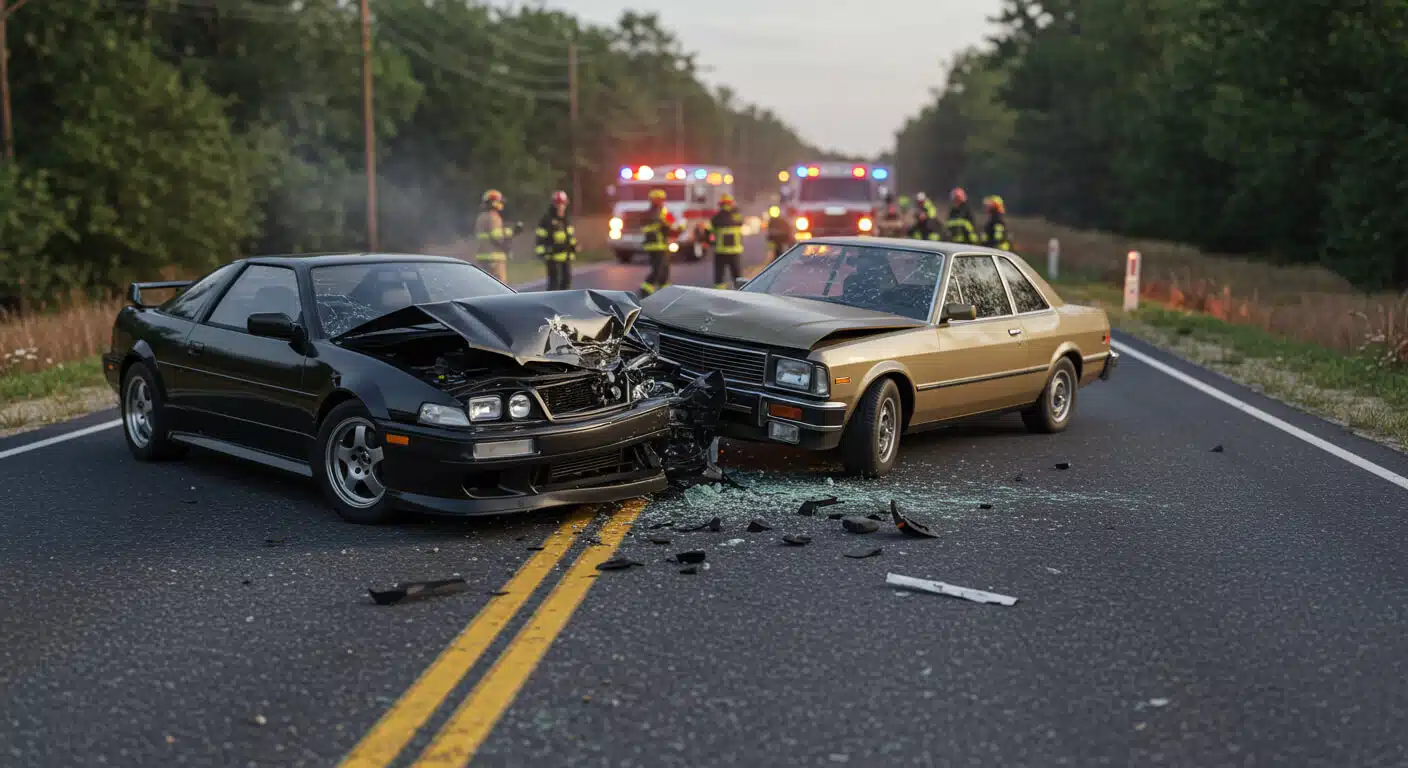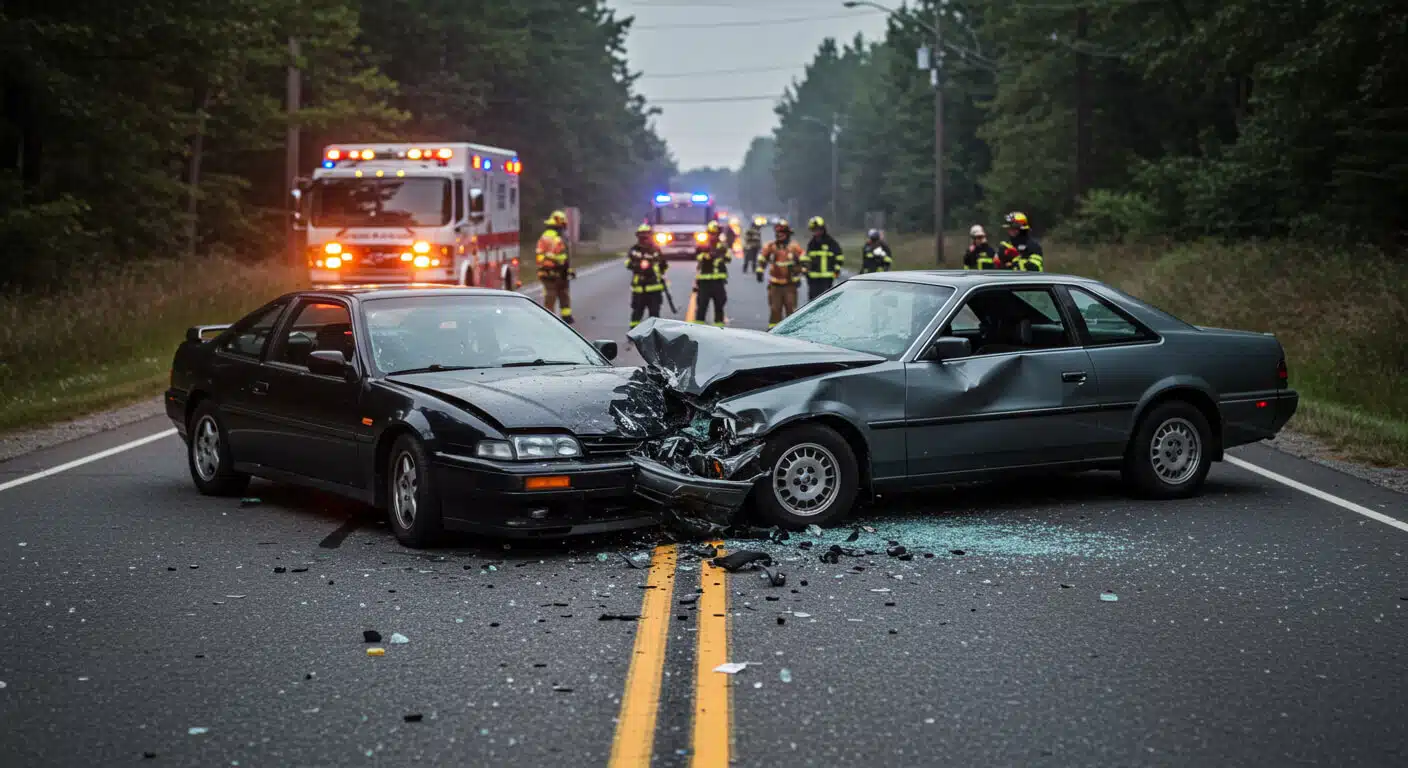
A motor vehicle accident can leave you feeling overwhelmed, unsure of your next steps, and dealing with more than just physical damage.
After a crash, you may face pain, paperwork, and pressure from doctor visits to tough insurance talks. Knowing what to do after a motor vehicle accident can make handling easier.
Even if it wasn’t your fault, what you do after the accident can affect your whole case. Every step counts; missing details could slow your recovery or lower your payout.
At Alpha Law Group, we stand beside accident victims during these high-stress moments. We aim to give you clarity, confidence, and strong legal support so you’re not navigating this process alone.
In this blog, you’ll learn:
- What to do immediately after a crash
- Why every step you take can protect or harm your case
- How legal support helps you focus on healing while we handle the rest
Let’s go step by step to get you ready.
Prioritizing Safety at the Accident Scene
Staying calm should be the first thing you do after a car accident. Focus on staying safe. The road conditions and how the cars sit on the road can make things riskier.
You should turn on your hazard lights to let others know there is a problem. If you can, move to a safe spot out of traffic. This helps keep everyone safe and lowers the chance of more crashes.
The next parts will show you what to do next. You will learn how to make the area safe, prevent other problems, and check how hurt people might be. These things are important to do right after a car accident.
Securing the Area and Preventing Further Hazards
Act fast to stay safe. Turn on hazard lights, use warning signs, and move your car to the side if it’s safe. Watch out for dangers like wet roads, debris, or skid marks. Knowing what to do after a motor vehicle accident helps prevent more accidents.
Stay clear of fuel leaks or live wires, and keep the area safe for emergency responders. Once the scene is secure, check if anyone is injured. These steps can protect lives and help first responders do their jobs effectively.
Assessing Injuries and Checking on All Parties
After a motorcycle accident, injuries may not always be visible right away. Start by checking yourself, then ask other passengers and other drivers if they need medical help. Call emergency services immediately if anyone feels dizzy, is in pain, or shows signs of injury.
Even minor discomfort can lead to serious issues, so don’t ignore it. Keep everyone calm and talk to them while waiting for help. Only move someone if it’s unsafe to leave them. Make sure everyone gets medical care first, and safety comes first.
What to Do After a Motor Vehicle Accident: When to Call 911
In Florida, call 911 right after a crash, especially if someone is badly hurt or the road is blocked. For minor issues, you may use other non-emergency numbers.
- When to Call 911 After an Accident: Call 911 if someone is badly hurt, the road is blocked, or a driver seems drunk. For minor cases, visit a Collision Reporting Centre. Always report the accident fast. Experts can find hidden injuries and make sure everyone gets the right care and records.
- What Information to Provide to Responders: Be clear with responders. Share your name, contact info, license number, location with landmarks, injury details, and needed help. Explain the damage, any danger, and what you did. Be honest, don’t admit fault, just state what happened. Clear info helps with your claim.
- Gathering Essential Information from the Scene: Record everything at the scene, exchange insurance info with other drivers, and get witness contacts. Please take photos of damage, skid marks, and the area before they’re gone. This helps your claim. Next, we’ll show how to collect the right evidence.
- Exchanging Details with Other Drivers and Witnesses: Stay calm and professional when speaking with others. Share contact, license, and insurance details. Write down vehicle and plate numbers. Ask witnesses for their info politely. Don’t discuss fault, just say what happened.
- Preserving Evidence Through Photos and Videos: Take wide shots of the scene, close-ups of damage, and photos of skid marks, debris, and weather. Take photos of street signs or landmarks to show the location. If you can, record a video. Clear visuals help prove your claim and show who’s at fault.
For more about traffic laws, emergency contacts, and safe driving practices in Florida, visit the Florida Department of Transportation (FDOT). They provide tips on road safety and what to do after a crash.
Understanding Your Legal Obligations in Florida
After a car accident in Florida, there are some legal obligations you must know about. Be sure to report the crash to law enforcement. This helps make an official record with a police report, and this step is important for insurance purposes.
Next, you have to share your insurance information with the other driver. This includes contact details and policy numbers. Florida uses a fault system, so you must meet certain insurance rules. This helps protect your rights and makes the claims process smoother.
Reporting the Accident to Law Enforcement
Documentation is significant after an accident. If you contact law enforcement, we will make an official police report. The police report is a key record for the claims process with your insurance and can help with any legal needs.
Police officers can collect relevant details, like witness statements and photographs of the damage. This helps ensure everyone knows who is at fault quickly. You can learn more about how crash records are used nationally by visiting the NHTSA Crash Data Systems page.
Complying with Florida Insurance Requirements
After a car accident in Florida, it’s very important to understand and follow the state’s insurance rules. This helps protect your legal rights. The state uses a no-fault insurance system, so you have to meet all the requirements.
Knowing your insurance policy well can really make the claims process go more smoothly. It helps you get the benefits you need for personal injury and property damage. Collect all key details at the scene, including the other driver’s insurance and records for your claim.
Seeking Medical Attention and Documenting Injuries
A quick medical checkup after a car accident is essential, even when you only see small injuries. Doctors and nurses can check you and record all injuries, even those that appear later. This helps you have an official record. This is important for the claims process later.
You should keep all your records safe. Hold on to your medical reports, insurance information, and any treatments you get. Take photos of your injuries and of the accident scene. All of these things are helpful and will make your case stronger.
Having all this information ready will make it easier to get fair compensation after a car accident. It can help you work through the claims process and give you a better chance of getting what you need for your recovery.
Importance of Immediate Medical Evaluation
Getting quick medical attention after a car accident is very important. It is needed not just for your health but also to help you with any claims in the future. Some injuries do not show up right away, so getting checked by a doctor ensures any problems are found and treated in time.
Paperwork from doctors, including medical reports and treatments, is strong proof when dealing with the complexities of car accident claims. A clear record of your injuries can also protect your legal rights. This can help you get fair compensation for medical expenses and any other harm from the accident.
Keeping Records of Treatments and Expenses
Keeping good records of treatments and costs after a motor vehicle accident is crucial for the claims process. You should write down every time you visit a doctor, get emergency services, or have tests and follow-up care. This will help you give the right details about your personal injury.
Ensure you include your insurance information, all receipts for your medical expenses, and everything about the cost of repairs. Keeping all this relevant information can help your case. It will also help you get fair compensation because you will have what you need to talk with your insurance provider and your legal counsel.
The Bottom Line
A car crash can be confusing, but knowing what to do after a motor vehicle accident, like keeping medical records, photos, witness info, and a report, helps you file a strong claim and show who was at fault.
At Alpha Law Group, we make sure accident victims don’t face this process alone. From collecting evidence to working with insurance companies, we’re here to protect your rights and fight for fair compensation.
Need help after a car accident?
Call (941)-304-1500 to schedule a free consultation.
Frequently Asked Questions
What should I avoid saying to the insurance company after an accident?
After an accident, don’t admit fault or make strong claims about injuries or damage. Wait until you know the full facts or speak with a legal expert. This protects your rights and future claims.
How soon should I contact a lawyer after a motor vehicle accident?
Call a lawyer immediately after a car accident, ideally within the first few days. Early legal help protects your rights, ensures you meet deadlines, and guides you through dealing with insurance companies effectively.
What compensation can I recover with Alpha Law Group’s help?
With Alpha Law Group, you can recover medical bills, lost wages, property damage, and pain costs. Our experienced team protects your rights and helps you pursue the full compensation you deserve after a car accident.
How long do I have to file a personal injury claim in Florida?
In Florida, you typically have two years from the accident date to file a personal injury claim. However, exceptions exist, so it’s wise to consult an attorney to protect your rights.
Why is documenting the accident scene so important for my case?
Documenting the accident scene is key to proving your claim. Photos, witness statements, and notes on conditions help show who was at fault and support your case for fair compensation after injuries or damages.



